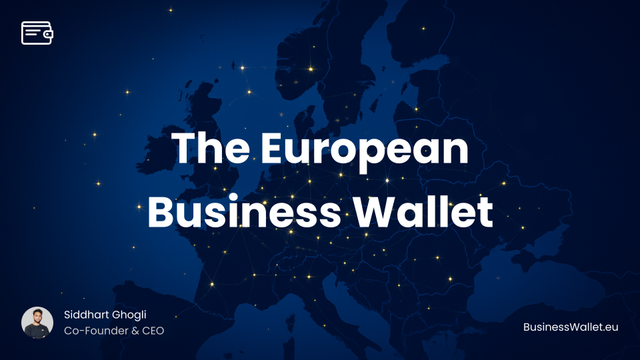What is The European Business Wallet?


The European Business Wallet (EBW) is a new digital identity solution created under the European Digital Identity Wallet (EUDI Wallet) initiative. It is designed to help businesses across the European Union identify themselves securely, complete regulatory tasks, and conduct transactions more efficiently, especially across borders. This blog offers a beginner-friendly guide to the EBW (European Business Wallet), exploring its purpose, features, and how it fits into the EU’s digital strategy.
What Is the European Business Wallet?
The European Business Wallet is a secure digital tool that allows companies to store, manage, and share official business credentials, such as:
- Business licenses and registrations
- Power of attorney or board mandates
- UBO (Ultimate Beneficial Owner) declarations
- Qualified electronic signatures and seals
These credentials are verified, tamper-proof, and can be used to interact with public authorities, financial institutions, and business partners across all EU countries. The wallet is built on the legal framework provided by eIDAS 2.0 and the European Digital Identity Regulation, ensuring the highest level of trust and security.
Why the European Union Created It
Businesses in the EU face challenges, especially small and medium-sized enterprises (SMEs)—face administrative challenges when working across different EU countries. Each country has its own systems and regulations, making it hard to verify identity or submit required documents efficiently.
The European Business Wallet (EBW) solves this by:
- Reducing administrative burdens and paperwork
- Standardizing business credentials across Member States
- Providing a trusted digital identity method backed by EU law
- Supporting cross-border interoperability for seamless business operations
This initiative is also part of the EU’s Digital Decade 2030 goals, which aim to make all key public services digitally accessible and secure.
How the Business Wallet Works
(Source: ARF Sections 2.1–2.5)
The Key Features
- Digital Identity & Authentication
- Authenticate as a business in online or offline services
- Use selective disclosure to share only the needed information
- Credential Management
- Store legal and compliance documents in one secure app
- Backup and transfer credentials between wallet providers
- Qualified Electronic Signatures
- Legally sign contracts and documents across the EU
- Audit Trails and Transparency
- Review all past interactions and data-sharing events
- Request data erasure or report suspicious activity under GDPR
- Pseudonym Use
- When legal identification isn’t required, authenticate using pseudonyms to protect business privacy
Large-Scale Pilots: Testing the Business Wallet
To ensure the wallet meets real-world needs, the European Commission launched several pilot programs involving over 350 partners from the public and private sectors.
First Wave of Pilots (2023–2025)
- EWC Consortium: Focused on travel and organizational credentials
- POTENTIAL: Explored banking, health, and electronic signature use cases
- NOBID: Targeted payment systems and service authorizations
- DC4EU: Covered educational and social security services
These pilots laid the groundwork for large-scale rollout and revealed practical considerations in wallet development and interoperability.
WE BUILD Consortium: Business-Focused Pilots
The WE BUILD consortium, launched in 2025, is a second-phase pilot specifically targeting business use cases.
What It Covers
- Organizational identity
- Power of attorney and legal mandates
- UBO (beneficial ownership) declarations
- eInvoicing and ePayments
- B2B credential exchanges
Key Participants
- Includes 197 partners from 23 countries, including business registries and private tech providers
Timeline
- Launch: September 2025
- Duration: 24 months
- Budget: €25 million (co-funded by the EU Digital Europe Programme)
Real-World Use Cases
Here are some practical ways the EBW will improve business operations:
- Cross-Border Tendering: Submit verified business info for tenders in any EU country.
- Bank Onboarding: Use the wallet to satisfy KYC/KYB checks when opening accounts.
- Customs Declarations: Share licenses and shipment details securely with border authorities.
- Partner Verification: Prove legal ownership and representation rights instantly.
- Contract Signing: Digitally sign agreements that are valid and trusted across the EU.
How to Prepare for the Business Wallet
Although the full rollout will vary by country, businesses can take early steps:
- Organize Business Credentials Ensure you have access to legal documents, registrations, and mandate details.
- Follow National Developments Watch for announcements from your government or Chamber of Commerce about wallet providers.
- Join Pilots or Industry Programs If you operate across borders, consider engaging with pilot programs like WE BUILD.
- Plan for Integration Think about how your business systems (HR, legal, finance) might integrate with wallet functions.
Get Ready for the European Business Wallet
As the European Business Wallet transitions from pilot to full implementation, now is the time to prepare. At BusinessWallet.eu, we’re here to help your company navigate this transformation. Whether you're an SME or an enterprise, we provide:
- Clear explanations of how the Business Wallet works
- Updates on wallet providers and rollout timelines in your country
- Guides for organizing and digitizing your business credentials
- Integration tips for onboarding, e-signatures, and cross-border operations
Subscribe to our newsletter for updates, or contact us to explore pilot opportunities and early access tools.
To learn more about specific topics like business use cases, application scenarios, or digital wallet security: visit our blog page and explore our growing library of insights.
Conclusion
The European Business Wallet is a major step toward making business processes faster, safer, and more unified across Europe. Whether you run a small shop or a multinational firm, this digital wallet will help you interact with governments and business partners more efficiently, all while keeping your data secure and under your control.
By combining legal trust, modern security standards, and real-world testing, the European Business Wallet is poised to become a vital tool for the next generation of EU-based businesses.